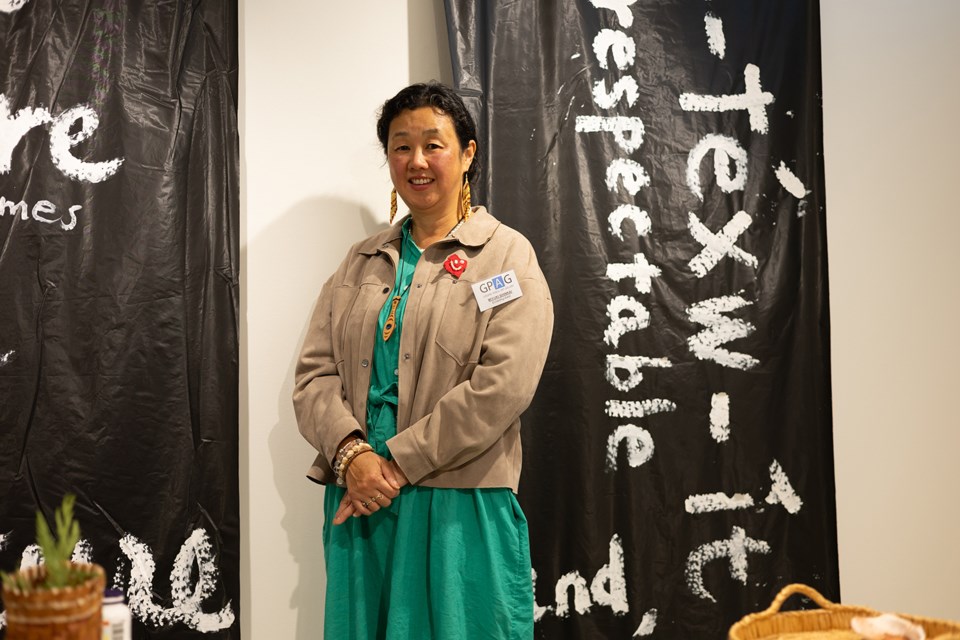An artistic symbiosis renewed after a year illuminates the importance of matriarchal power in Japanese and Coast Salish societies.
Two Sunshine Coast artists — Jessica Silvey and Miyuki Shinkai — collaborated during the 2023 Sechelt Arts Festival’s Mind Over Matter showcase at the Seaside Centre.
“We’ve been working together for quite some time on the Truth and Reconciliation concept,” said Shinkai, a Japanese-born and now Langdale-based glass blower and designer. “You might not see a big object or something in progress but we’ve been talking about how we can incorporate our ideas and chart a path to truth and reconciliation.”
Shinkai and Silvey’s freshly updated collaboration — under the title Echo from the Ancestral Land — opened in the Eve Smart Gallery of the Gibsons Public Art Gallery with a public reception on Sept. 28.
Silvey, a weaver, educator and owner of the Red Cedar Woman Weaving Studio in Sechelt, gathered traditional artifacts to express the rich culture of the shíshálh Nation before its encounter with colonial powers. Each is contrasted with contemporary and commercial equivalents.
In her three-dimensional assemblage Medicine, Silvey presents mass-produced pharmaceuticals (including a plastic bottle of calciferol branded as “The Sunshine Vitamin”) as a counterpoint to cedar boughs and branches gathered in hand-woven baskets. A loosely knotted cedar headband is placed nearby. The rough-to-the-touch circlet draws attention to the vitality of the thing it is designed to wreathe: the seat of human intellect.
“In the last 15 years, Coast Salish communities have seen an immense revival in Salish weaving and cedar bark weaving,” said Jessica Silvey in her artist’s statement. “Young children to Elders are weaving and connecting with each other and to their culture.”
Among the found objects of Needle, a seafoam plastic container of metal sewing needles seems antiquated compared to the inviting solidity of sharpened bone.
For Shinkai, who created a series of wall hangings featuring inscriptions in Japanese calligraphy, English, French and sháshíshálh (“We are the nature”), the value of traditional clothing and tools recalls her own upbringing and heritage.
“My town is near Kyoto and the oldest ceramics they found there were 20,000 years old,” said Shinaki. “Everything was specialized craft. People had to learn how to weave and grow their own food, how to shelter and dress, whether they were fishermen or farmers.”
While working together, Silvey and Shinkai frequently shared a wordless moment of recognition between Japanese and shíshálh customs — then laughed at the distance between traditional forms of manufacture and the plastic vacuousness of capitalist production. “People are becoming so unable to do anything on their own,” observed Shinkai. “It’s a lot more fun if you are able to make your own things. It’s good for your mental health too. We talk about that all the time, about keeping your fingers busy.”
The two artists discovered another cultural parallel: the way that elder women are accorded power and respect. “In Japan, mentorship was just embedded,” added Shinkai. “Somebody who’s older, you bow and you learn from [them]. And as you get older, you take a lot of people as your pupils. That’s largely done by women in the community.”
Similarities to matriarchal authority in Coast Salish traditions became clear. As both Japanese and shíshálh communities rediscover the richness of traditional practices, women are at the forefront. “We cannot change the past,” said Silvey. “We can heal from it and we can choose how to weave our own future.”
Echo from the Ancestral Land remains on display at the Gibsons Public Art Gallery until Oct. 27.



